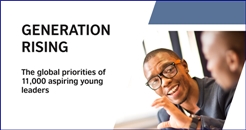 Generation rising
Generation rising
From a blog by Common Vision
What are the global priorities of 11,000 aspiring young leaders?
In an age of globalisation, rapid change and hyperconnectivity, what do aspiring young leaders want the future to look like? What are their most important policy priorities, and what do they expect of leadership? Are there significant differences in attitudes between young leaders from across the world?
A new report, Generation Rising examines the visions and priorities for global change amongst aspiring millennial leaders (aged 18-35) around the world.
Common Vision worked with the British Council to understand the most important priorities for global change amongst aspiring young leaders aged 18-35 from Egypt, India, Indonesia, Kenya, Mexico, Morocco, Nigeria, Pakistan, Tunisia, the United Kingdom and the United States. Their qualitative analysis was based on responses from almost 11,000 applicants to the British Council’s Future Leaders Connect programme, a global network which aims to enable young leaders from the around the world to develop their expertise, connect and discuss major global policy challenges.
Results showed that young global leaders share similar visions for the future with one another, as well as prioritising policy areas that will affect future generations. They identified 29 broad themes that were used either to describe a positive vision for the future (such as increased tolerance and social cohesion, or more education opportunities), or a response to negative circumstances (such as the alleviation of poverty or an end to corruption). These themes provide a ‘league table’ of the top priorities for young leaders in each country and as a global cohort.
There were of course some differences between countries. But particularly striking are the similarities in the most important priorities across the countries. Education, climate change and the environment were in the top five priorities for all countries. Addressing poverty and inequality, promoting gender equality, economic development, tolerance and diversity, and international security and peace, were also common themes.
What are the core qualities and characteristics of an effective leader in the eyes of these millenials?
Responses to this question were also notably similar. In all 11 countries, ‘working with a team’ – including mentions of teamwork, co-operation and shared goals – was the most frequently mentioned characteristic.
This snapshot of the priorities and perspectives of aspiring future leaders provides important insight into the shape of future global policy leadership, and ideas which could help foster longer term legitimacy and trust.
Download the report from here.
Retweet about this article:
From a blog by Common Vision, 07/11/2017